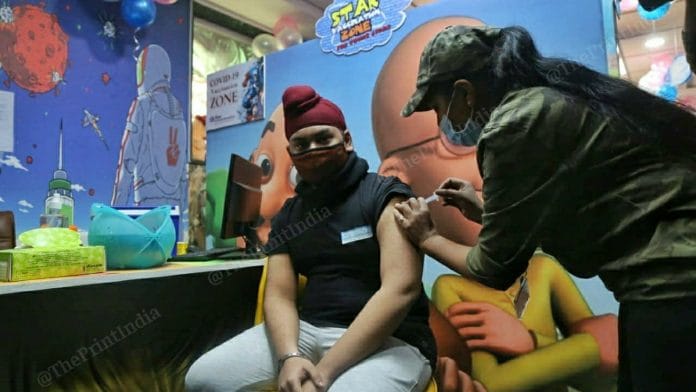New Delhi: Delhi could be looking at a daily Covid caseload of 40,000-1 lakh in the coming weeks, with the number of active cases rising to about 10 lakh.
This was the projection shared during Tuesday’s meeting of the Delhi Disaster Management Authority (DDMA), ThePrint has learnt from government officials who attended the interaction.
On Tuesday, Delhi reported 5,481 fresh Covid cases. During the second wave, Delhi’s daily cases peaked at about 28,000.
The DDMA meeting discussed measures to control the daily numbers and the level of preparedness, and decided to start weekend curfews in the city as a precautionary measure.
Among the special invitees at the meeting were Deputy Chief Minister Manish Sisodia, NITI Aayog member (health) Dr V.K. Paul, Delhi Health Minister Satyendar Jain, ICMR Director General Dr Balram Bhargava, AIIMS Director Dr Randeep Guleria, and National Centre for Disease Control Director Dr S.K. Singh.
According to sources, the experts present at the meeting highlighted the importance of stocking up not just on drugs like tocilizumab and remdesivir but also paracetamol to ensure there is no crisis situation.
Plans were also discussed to send samples of all hospitalised patients for genome sequencing instead of the current practice of random sequencing, to determine whether a patient has been infected with the Delta or the Omicron variant of the SARS-CoV-2 virus.
“Delhi’s daily case numbers could go anywhere between 40,000 to 1 lakh cases per day and the active caseload could go up to 10 lakh. If we also factor in patients coming from the NCR, it could go as high as 15 lakh,” a senior official present at the meeting told ThePrint.
“Even with 10 lakh active cases, with a hospitalisation rate of 4-5 per cent, we would need about 50,000 beds. During Delta, the hospitalisation rate was about 18-20 per cent. But right now we also do not know what the average hospitalisation duration will be,” the official added.
Delhi currently has 9,042 Covid hospital beds, of which 8,511 are vacant, according to the latest Covid bulletin of the Delhi government.
The number of active cases currently is 8,397, of which over 56 per cent are in home isolation. At the peak of the second wave in May last year, Delhi had 25,106 dedicated Covid beds.
The escalation plan shared at the DDMA meeting envisages raising the number of beds to 37,000.
The experts at the meeting also flagged the issue of human resources, the sources said.
“A senior doctor pointed out that given the high transmissibility of Omicron, absenteeism is inevitable in hospitals because doctors and nurses who have been exposed would need to isolate so as not to jeopardise other patients,” said a second official. “So, even if bed strength is increased, there would be a problem of manpower. Discussions are now on about a plan to rope in medical students and retired doctors and nurses.”
Oxygen availability
As of 1 January, Delhi had 790 metric tonnes (MT) of liquid medical oxygen available, with a buffer reserve of 442 MT. Apart from this, medical institutions have cylinders that can cumulatively hold 217 MT oxygen.
There are also over 15,000 cylinders in reserve. The total capacity of Pressure Swing Adsorption (PSA) plants is 103.27 MT and four plants are to be installed by 5 January, the meeting was told.
A total of 98 PSA plants, including nine that are still pending, are expected to be functional by the end of the month.
Among the drugs that have been stocked up are amphotericin B, dexamathasone, immunoglobulin injections, methyl prednisolone, remdesivir and tocilizumab.
“Experts present in the meeting said while stocking up on all these drugs is important, given the projections, it may also be crucial to ensure that enough supplies of paracetamol are available. We are working towards that as well,” said another official who attended the meeting.
The current estimate is that 75 to 80 per cent of Delhi’s cases are because of Omicron, officials said. “The meeting discussed the need to change the genome sequencing strategy from randomly sending samples for sequencing to sending samples of all hospitalised patients. Given how the two dominant variants Delta and Omicron behave, it may be important in the coming days to be able to make the distinction between the two at least in all hospitalised patients,” the official added.
The meeting also discussed more stringent measures to control the spread but a decision was taken to watch the situation for another week.
(Edited by Sunanda Ranjan)
Also Read: Delhi imposes weekend curfew as Covid cases surge, but buses & Metro to run at full capacity






